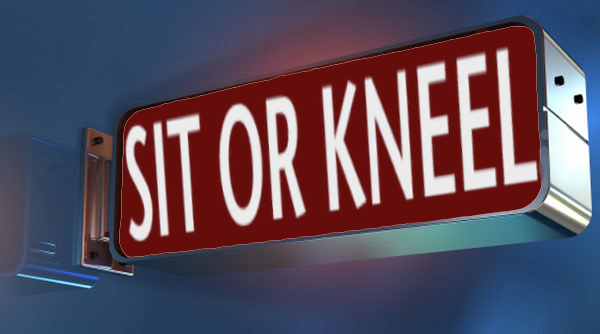Whatever Happened to Kneeling?
by Dean Merrill
On a January day a few years back, in the main ballroom of the Washington Hilton, 2,000 politicians, captains of industry, and other notables gathered for the annual Leadership Luncheon. Republicans and Democrats eyed each other under the chandeliers, their animosities put on hold for a couple of hours. They looked to the dias with polite respect, where the main speaker, Atlanta pastor and television luminary Charles Stanley, announced his text: “The prayer of a righteous man is powerful and effective” (James 5:16).
He preached that day eloquently and fervently about the need for America to humble itself before God–as Elijah had done, as Solomon and others had done. Near the end of his message, he began to creep out onto a bit of a limb. Without raising his voice, he mused, “What would happen today if 2,000 people got on their knees, humbled themselves before God, and cried out for forgiveness?”
He dropped a few more hints, and gradually the aristocratic crowd realized he was serious. He was talking about them getting down on their knees–in their dark Brooks Brothers suits. He allowed that some might not be physically able, but for the rest he said, “Unless God does something in this nation, we are going to be humiliated in some fashion, at some time… I want to ask you if you’ll join me on my knees … and pray until whenever the moderator thinks the time is over.” With that, he turned and dropped out of sight. End of sermon.
The ballroom went quiet. There was a gradual shuffle of chairs, and before long most of the crowd had indeed followed the speaker’s lead. A sober, reverent mood filled the room.
Out of Style?
What Charles Stanley had the nerve to ask that day pertains to an ancient practice gradually fading from contemporary Christianity. Who can deny that over the past 25 years we have been kneeling less and less? Certain formal occasions still require it, of course: weddings, ordinations, commissioning services for overseas ministry, and the Eucharist in some traditions. Otherwise, we don’t kneel before a holy God much anymore. Instead, we face one another and join hands. Kneeling is being replaced by our more interactive, “let’s share” approach to spiritual matters.
Of course, it doesn’t really matter, does it? Certainly God can hear us from any posture. If modern folk would rather not be bothered, why press them? The important thing is that they pray at all.
And let’s face it: Kneeling is a tad uncomfortable. With all the bad backs in America today, we wouldn’t want to aggravate already-tender disks. Furthermore, it is rather unflattering, is it not? Nobody looks terrific from behind.
The great Reformer John Knox had a far more serious complaint about kneeling; he viewed it as a “Romish” deception. Fully justified Protestants, he reasoned, ought to face God with more confidence and self-assurance. (The example of such kneelers are Solomon, Ezra, Daniel, Peter, Paul, and Jesus didn’t seem to count.)
Reasons to “Bother”
Modern sophisms notwithstanding, I still find myself wondering if kneeling doesn’t hold some value. When I get down on my knees to pray, the quality of my interaction with God is somehow changed. And I don’t think it’s just the nostalgic memory of boyhood days when, as a preacher’s kid in Grand Detour, Illinois, I knelt on a plank floor with the rest of the congregation at our Wednesday night prayer meetings. I benefit from the practice now.
The biggest benefit is that kneeling reminds us who’s who in the dialogue. Prayer is not a couple of fellows chatting about the Dallas Cowboys. It is a human being coming face to face with his or her Supreme Authority, the ineffable God who is approachable but still very much the One in charge.
Thus, kneeling is a way of saying, “I fully understand who’s Boss here. Far be it from me to try to manipulate you or play games with you. I’m well aware of my status in this relationship, and I deeply appreciate your taking time to interact with me.”
An analogy comes to mind. Have you recently read the fine print of a house lease agreement? If you haven’t, let me tell you that the teeter-totter is far from evenly weighted!
If you, the renter, break something, you fix it. You are not to put any holes in the ceilings, floors, or woodwork. No, you may not keep a pet. Yes, you have to keep all the plants, shrubs, and trees looking good–even if you personally happen to hate gardening. If the landlord thinks a vehicle in the driveway is “unsightly,” you get three days to move it–or he’ll have it towed and sold. He can ring the doorbell for an inspection at any time. When you move out, he will be the sole judge of whether the place is in good order and repair. And if, when the lease is up, you move out a few days early, you will not be getting a refund. But if you hang around a few days extra, you’ll pay a full month’s extra rent.
Everything tilts the landlord’s way. Why? Because it is his house. And in that house, you are merely a guest.
Perhaps we should pay closer attention to who owns our world and our lives. We are not God’s peers. We never will be.
We have been better at calling him Lord and singing songs about his lordship than at living it. Kneeling humbly before God, we can regain the right perspective.
Added Benefits
I have noticed some side benefits to kneeling that also deserve mention.
One is that kneeling reduces our temptation to make speeches to God. Our flowery, oratorical prayers just don’t seem to fit the occasion. In addition, those praying with us are not in a position to appreciate our grandstanding; we’ve lost our human audience. The sound of our voices is aimed downward, not outward. So we might as well be straightforward with God.
Another benefit is that kneeling reduces visual distraction during prayer. We can’t see a whole lot on our knees. It is hard to glance at the clock and check whether we “really ought to be going now.” We don’t notice other people in the room (or the church) quite so easily. Our field of vision is greatly narrowed, forcing us to deal with the Person at hand. Kneeling therefore aids concentration.
Finally, better concentration leads to better thought and expression. When I ask God, “What do you think about this?” or “How should I solve that?” while I am on my knees, I am continually amazed at the concepts that silently enter my mind. It has happened so many times over the years that I am tempted to suggest there is a physiological connection between kneeling and clear-headedness. But whatever the cause, I seem to find the mind of God more quickly and cogently on my knees than in any other posture.
Of course, we cannot claim that God likes kneelers better than non-kneelers. And we can point to no Scripture that commands us to kneel when we pray. But neither should we ignore the practice because it is mildly inconvenient.
Nor should we discount the biblical prototypes. It would not hurt us to remember James, the Lord’s brother and godly leader of the Jerusalem church until A.D. 61–when he was stoned to death. According to Hegesippus, quoted by Eusebius, “He was in the habit of entering alone into the temple, and was frequently found upon his knees begging forgiveness for the people, so that his knees became hard like those of a camel, in consequence of his constantly bending them in his worship of God.”
There are not too many camel knees among North American Christians, I suspect. But if we want the steady wisdom and divine touch of James and his contemporaries, we might reconsider their habits of prayer and their posture of devotion.
(This article was originally published in September of 2005…Have we continued our trend towards less kneeling since the writing of this article or has kneeling becoming a more significant part of our spiritual expressions in the last 8 years?)
Dean Merrill is the author of 10 books and co-author 35 other books. He has served the FCA and many other ministries through his gifts as a writer and editor. He and his wife, Grace, live in Colorado Springs. For more of his writings, see: www.deanmerrill.com.


